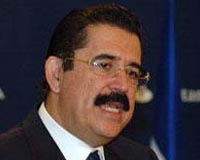| . |  |
. |
Tegucigalpa (AFP) July 15, 2009 Interim Honduran leader Roberto Micheletti reimposed a late-night curfew beginning Thursday in a bid to curb disturbances from supporters of ousted president Manuel Zelaya. The reinstatement of the curfew, which became effective between midnight and 5:00 am (0600 and 1100 GMT), came after Micheletti said he would be prepared to step down, but only if Zelaya does not return to power. "For peace and tranquility in the country... without the return of ex-president Zelaya, I would be ready to do it," he said Wednesday. The comments appeared to be a softening of his position since talks to resolve the country's crisis were adjourned last week without any resolution, as the coup leaders insisted they would remain in power. Micheletti confirmed that he would not return to San Jose, where Costa Rican President Oscar Arias has mediated talks between the rival leaders, for a new series of meetings later this week, leaving the job instead to his team of negotiators. The Central American nation has been convulsed with protests and flashes of violence since Zelaya was forced out of the country at gunpoint on June 28. Although Micheletti has support from the Honduran military, which helped orchestrate last month's coup, he has faced a barrage of criticism from the international community. The new authorities of Latin America's third-poorest country have already seen the freezing of loans from several international financial organizations and part of its aid from the United States. But Micheletti's de facto government has still insisted it has "complete control over the country" and the attorney general has said Zelaya would be arrested if he returned to Honduras. Worried that time is on Micheletti's side, Zelaya's foreign minister, Patricia Rodas, said the mediation brokered by Arias -- who won the 1987 Nobel Peace Prize for helping resolve Central America's civil wars -- "is being used to give a break to the right and the de facto regime." Since his ousting, Zelaya has tried to garner the backing of regional powers and rally his supporters back home, at one point making an aborted attempt to return and on Tuesday calling for a popular insurrection. Speaking from Guatemala, Zelaya described insurrection as a legitimate democratic right "when faced with a usurping government and a coup-supporting military," and urged his supporters in Honduras to strike, march and engage in civil disobedience. But the "insurrection" never materialized on Wednesday, although some 5,000 Zelaya supporters took to the streets in the Honduran capital Tegucigalpa, according to organizers. They had planned massive protests and roadblocks throughout the country for Thursday and Friday, leading Micheletti to renew the curfew that had first been imposed after Zelaya's ouster and was suspended on Saturday. In announcing the curfew, Micheletti cited rumors that Zelaya planned to return to Honduras Saturday "from the southern border" and with the help of an "armed group." Micheletti and his entourage have staunchly rejected accusations that removing Zelaya was a coup, and instead accuse the president of defying a Supreme Court ruling and ignoring the constitution. Zelaya, a wealthy rancher who moved sharply left after taking office in January 2006, rattled his country's ruling elite by trying to bypass Congress to hold a referendum on rewriting the constitution. He has denied charges that the move was a bid to lift the one-term presidential limit so he could seek re-election this year. Share This Article With Planet Earth
Related Links Democracy in the 21st century at TerraDaily.com
 Deposed Zelaya calls for insurrection in Honduras
Deposed Zelaya calls for insurrection in HondurasGuatemala City (AFP) July 15, 2009 Deposed Honduran leader Manuel Zelaya has called for a popular insurrection in his country so he can be returned to power after soldiers removed him at gunpoint on June 28. "The Honduran people have the right to insurrection," said Zelaya, speaking Tuesday in the neighboring Central American country of Guatemala. Insurrection is a legitimate democratic right "when faced with a usurping ... read more |
|
| The content herein, unless otherwise known to be public domain, are Copyright 1995-2009 - SpaceDaily. AFP and UPI Wire Stories are copyright Agence France-Presse and United Press International. ESA Portal Reports are copyright European Space Agency. All NASA sourced material is public domain. Additional copyrights may apply in whole or part to other bona fide parties. Advertising does not imply endorsement,agreement or approval of any opinions, statements or information provided by SpaceDaily on any Web page published or hosted by SpaceDaily. Privacy Statement |